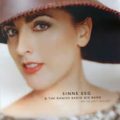Sinne Eeg – We’ve Just Begin
Posted on Sunday, March, 29, 2020 | Comments Off on Sinne Eeg – We’ve Just Begin
Any vocalist who can summon the world-class Danish Radio Big Band to serve as a backup group must have something special to offer. Sinne Eeg, whose lustrous voice uplifts and illuminates her ninth album, We’ve Just Begun, has all of that and more. Eeg, as it turns out, is a shining star in her native Denmark—and if she weren’t, she certainly should be. Singing mostly in English, Eeg displays a charming voice that is strong and clear and a style that is jazz-inflected but unmannered, in the image of her role models: Ella Fitzgerald, Sarah Vaughan and Anita O’Day. For comparison’s sake, the contemporary vocalist who springs to mind is Roberta Gambarini, and there can be no higher compliment than that. No less than four of Eeg’s earlier albums earned Danish Music Awards for Best Jazz Vocal Album of the Year, and the impression here is that We’ve Just Begun should be a strong contender for Music Award No. 5. Besides singing, Eeg wrote or co-wrote half of the album’s ten selections, starting with the album’s opener / title song, a freewheeling swinger on which Eeg’s buoyant vocal (and scat chorus) is underlined by the band and tenor saxophonist Hans Ulrik. Eeg wrote the engaging waltz, “Like a Song,” which follows, and co-authored the wistful and meditative ballad, “Those Ordinary Things,” with lyricist Helle Hansen. The DRBB’s rhythm section shines on “Talking to Myself,” an old-line swinger on which Eeg showcases her admirable jazz chops, grooving and scatting in a style that would certainly have pleased the above-named role models. She sings in Danish on “Hvorfor er Lykken Sa Lunefuld,” a melodic song from the 1937 Danish film A Consummate Gentleman, before addressing the first of three American evergreens, Rodgers and Hammerstein’s “My Favorite Things,” whose even-tempered opening stanza gives way to a fiery midsection with burning solos by tenor Frederik Menzies and drummer Soren Frost. As if to show there is...
The “Vocal Sound of Jazz” 40 Years
Posted on Tuesday, December, 24, 2019 | Comments Off on The “Vocal Sound of Jazz” 40 Years
The “Vocal Sound of Jazz” returns on Saturday January 4, 2020 with a program celebrating the beginning of our 41st year. We will be reprising many of the songs and artists that were featured on our debut broadcast in 1980 and a will also be looking ahead as we spotlight recent releases by Tony Desare, Cathy Segal-Garcia, and Vince...
Lisa Rich – High Wire
Posted on Friday, September, 27, 2019 | Comments Off on Lisa Rich – High Wire
Lisa Rich was one of the most promising jazz singers of the 1980s. Blessed with a very attractive voice, she performed in a wide variety of often-prestigious settings during a 15 year period. She made her recording debut with her album Listen Here in 1983 and was featured at a Pops concert in 1985 with the Baltimore Symphony Orchestra. Lisa recorded Touch Of The Rare with Clare Fischer in 1985. The following year she performed at a series of groundbreaking concerts in China (the first jazz events in China since 1949) and she also sang in India in 1990. Unfortunately bad health eventually forced her to stop performing altogether so she opened up a music studio and has worked as a teacher ever since, giving private lessons and conducting workshops. In 1987, Ms. Rich recorded her third album which she recently remixed and is releasing for the first time. She had made the acquaintance of Chick Corea who gave her several of his songs, only one of which (“Bud Powell”) is well known. With sensitive support provided by pianist Marc Copland (David Kane takes his place on two numbers), bassist Drew Gress and drummer Michael Smith, Lisa Rich interprets five Chick Corea songs, two by Ralph Towner, one apiece by Duke Ellington, Ornette Coleman and Loonis McGlohon, and the standard “We’ll Be Together Again.” Although the material is often challenging with some wide interval jumps (the Corea and Towner pieces were not originally meant to feature a singer), Lisa Rich sounds relaxed throughout, and her vocal flights sound effortless and natural. The opener, Corea’s “High Wire The Aerialist,” was not recorded by anyone else until the composer with singer Chaka Khan documented it in 2009, 32 years after this version. The beauty of Lisa Rich’s voice and the ease in which she sings the intervals are very much in...
Gretje Angell – In Any Key
Posted on Tuesday, August, 27, 2019 | Comments Off on Gretje Angell – In Any Key
Gretje Angell, the daughter and granddaughter of drummers, was born to sing jazz. Her alluring voice has a beautiful tone, she digs into the lyrics that she interprets, and she is a superior scat-singer. For her debut recording, In Any Key (named cheekily after Dori’s ability to play any song in any key at Gretje’s behest), Ms. Angell is joined by guitarist-producer Dori Amarilio, Chuck Berghofer, Kevin Axt or Gabe Davis on bass, drummer Steve Haas, percussionist Kevin Winard, and a few guest musicians. The first four selections display the set’s variety and quality. They include a bossa-nova version of “Our Love Is Here To Stay” (which has some warm and inventive scatting), a swinging rendition of “I’m Old Fashioned,” a quietly sensual and Latin-flavored “Fever,” and the ballad “Deep In A Dream” in which the singer shows how she sounds being accompanied by a 60 piece orchestra. The high quality continues throughout the second half of the program which includes “Berimbau” (on which Gretje Angell sounds like she is a native of Brazil), a revival of Duke Ellington’s “Do Nothing Til You Hear From Me,” and three duets with guitarist Amarilio: “One Note Samba,” a charming rendition (complete with verse) of “Tea For Two,” and an uptempo and scat-filled “Theme There Eyes.” “Gretje Angell was born in Akron, Ohio and early in life she regularly accompanied her father to jazz clubs for his gigs. She learned to play string bass and cherishes her memories of playing with her father at jam sessions. She studied classical music in college, spent time away from music, moved to Los Angeles, and became an important part of the local jazz scene. In addition to leading her own groups, she has sung with the Ladd McIntosh Swing Orchestra, Jack’s Cats, and Glen Garrett’s Big Band, also being active as a soprano with the Los Angeles Metropolitan Opera Company.” Gretje Angell has worked often with guitarist-producer-arranger Dori Amarilio and he makes many valuable contributions...
Veronica Swift – Confessions
Posted on Monday, August, 26, 2019 | Comments Off on Veronica Swift – Confessions
Times change. In the Me Too era it is clearly politically incorrect for a female singer to sidle up to the microphone and huskily breathe “My Heart Belongs To Daddy” like Julie London used to do. Or even, for that matter, to lustily proclaim “Diamonds are a Girl’s Best Friend” like Marilyn Monroe. But a residue of that sort of thing (it’s called sex appeal) needs to remain, regardless. Veronica Swift is the epitome of a modern female jazz singer. She can wear figure-hugging evening gowns and high heels, but she’ll look her audience in their collective eye and state defiantly, “You’re Gonna Hear from Me.” That’s the one that goes, “Move over, sun and give me some sky; I’ve got these wings I’m eager to try.” She comes back down to earth with a fine interpretation of Billie Holiday‘s “I Don’t Want to Cry Anymore”: “Oh, why can’t I forget you; I know so well what is in store. A moment or two up in the clouds with you, Then back where I was before.” “Forget About the Boy” and her own bittersweet “I Hope She Makes You Happy” leaven the mix: love seen from different angles. Talking of which, there’s “Confession/The Other Woman,” an angle on love that is rarely celebrated in song.Veronica Swift chooses her songs with great care. She grew up touring with her parents, jazz pianist Hod O’Brien and singer Stephanie Nakasian. So she knows the score. She made her first appearance at Jazz at Lincoln Center when just 11 years old. In 2015 she won second place in the Thelonious Monk Jazz Competition and a year later headlined at the Telluride Jazz Festival. A residency at Birdland in New York followed, and in 2018 she began touring with trios fronted by pianists Emmet Cohenand Benny Green, both featured on this album. Her songs are marvelously well-crafted performances rooted in tradition,...
Tessa Souter “Beyond The Blue”
Posted on Wednesday, August, 21, 2019 | Comments Off on Tessa Souter “Beyond The Blue”
Three of the tracks—“The Lamp Is Low,” based on Ravel’s “Pavane”; “My Reverie,” built from Debussy’s “Rêverie”; and “Baubles, Bangles and Beads,” from Borodin’s “String Quartet in D”—will be instantly recognizable, though Souter’s slow, sensual readings are stunningly original. A fourth is based on another Borodin composition, his “Polovetsian Dances,” transformed more than a half-century ago into “Stranger in Paradise,” but here reimagined by Souter as the more intimately romantic “Dance With Me.” The eight remaining tracks embrace source material both familiar (Beethoven’s “Seventh Symphony,” Brahms’ “Symphony No. 3”) and comparatively obscure (Tomaso Albinoni’s “Adagio in G Minor,” Gabriel Fauré’s “Pavane” and his “Elegy”), all refitted with splendidly crafted Souter lyrics. In the liner notes, Souter says that the majority of the arrangements “emerged spontaneously in the studio.” Such alchemic dexterity is a rare pleasure. By Christopher Loudon “Jazz...








 The VOCAL SOUND OF JAZZ began airing on 89.5 FM (now WHRV-FM) on January 4th 1980. Originally a 30 minute program that aired on Friday evenings, the program expanded to it current 60 minute format and moved to Saturday evenings during the 90s. It was also aired over WUOM in Ann Arbor, Michigan for a five-year period in the late 1980s.
Produced and hosted by Jack Frieden since its premiere broadcast, the program has always attempted to spotlight both jazz vocal music’s post 1950s history, as well as the new singers and songs that will continue to play an increasingly prominent role in the music’s future. With the internet’s ability to attract and entertain jazz vocal fans globally, Jack looks forward to broadening the mission and reach of the “Vocal Sound of Jazz” in coming years.
Email Jack Frieden
Vocal Sound of Jazz LLC
1056 Downshire Chase
Virginia Beach, Va. 23452
Ph: 757 438 6785
The VOCAL SOUND OF JAZZ began airing on 89.5 FM (now WHRV-FM) on January 4th 1980. Originally a 30 minute program that aired on Friday evenings, the program expanded to it current 60 minute format and moved to Saturday evenings during the 90s. It was also aired over WUOM in Ann Arbor, Michigan for a five-year period in the late 1980s.
Produced and hosted by Jack Frieden since its premiere broadcast, the program has always attempted to spotlight both jazz vocal music’s post 1950s history, as well as the new singers and songs that will continue to play an increasingly prominent role in the music’s future. With the internet’s ability to attract and entertain jazz vocal fans globally, Jack looks forward to broadening the mission and reach of the “Vocal Sound of Jazz” in coming years.
Email Jack Frieden
Vocal Sound of Jazz LLC
1056 Downshire Chase
Virginia Beach, Va. 23452
Ph: 757 438 6785